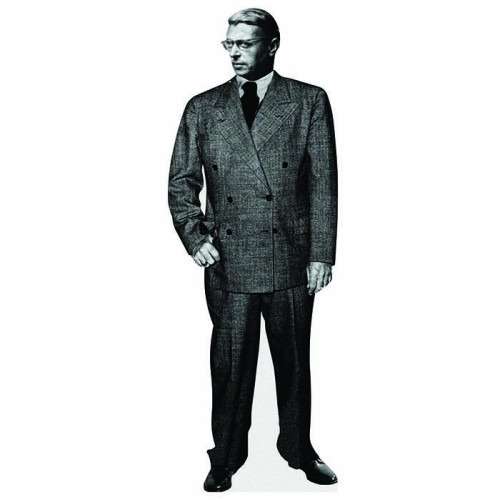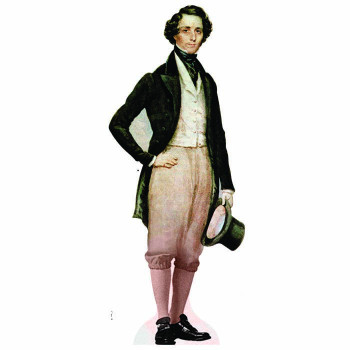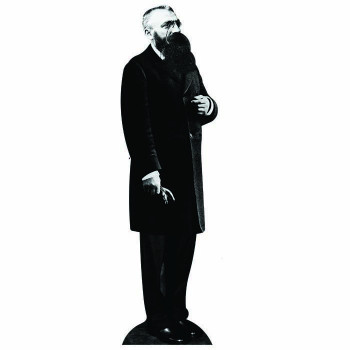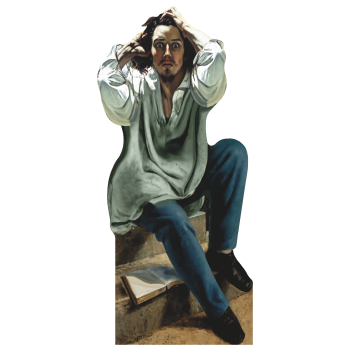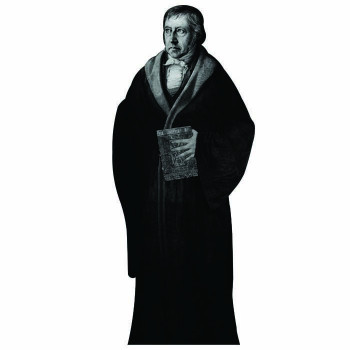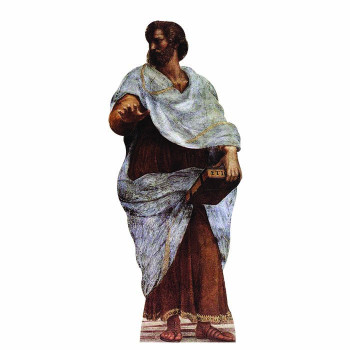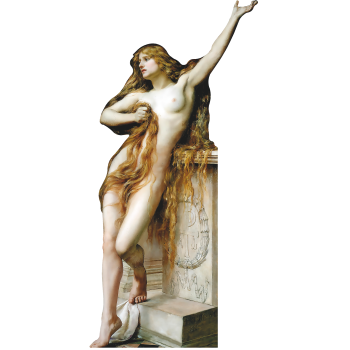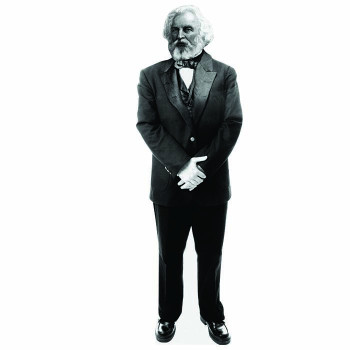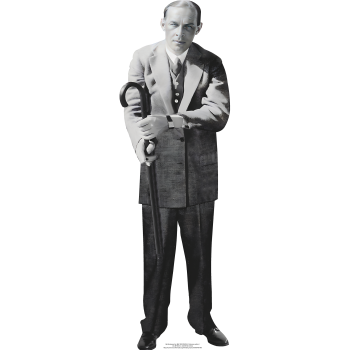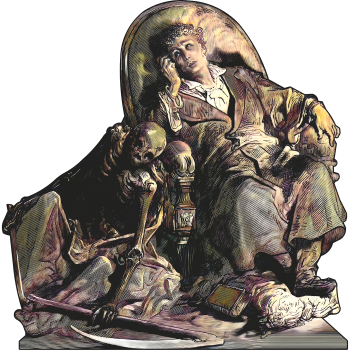JEAN-PAUL SARTRE CARDBOARD CUTOUT
-
$0.00
Available Options
60 x 21 inches. Our cardboard cutout of Jean-Paul Sartre. All cardboard cutouts come folded and have an easel attached to the back to be self-standing. Items are printed and produced to order. Printing and processing takes up to 5 business days plus shipping time.
Introduction to Jean-Paul Sartre
Celebrate the legacy of one of the most influential existentialist philosophers with our lifesize cardboard cutout of Jean-Paul Sartre. Perfect for philosophical displays, educational events, or as an inspiring addition to your home or office, this cutout captures the profound and intellectual presence of Jean-Paul Sartre, reflecting his significant impact on philosophy and culture.
Background of Jean-Paul Sartre
Jean-Paul Sartre was born on June 21, 1905, in Paris, France. He was raised by his mother and grandparents after his father passed away when Sartre was just a toddler. Sartre's early education was marked by a keen interest in literature and philosophy. He attended the prestigious École Normale Supérieure, where he met Simone de Beauvoir, who would become his lifelong companion and intellectual partner.
Sartre's philosophical career began in earnest with the publication of "Being and Nothingness" (1943), his seminal work on existentialism. In this work, Sartre explores concepts such as existence, freedom, and the nature of consciousness. He argues that humans are "condemned to be free," meaning that we are responsible for our actions and the creation of our own essence through those actions. This idea was encapsulated in his famous phrase "existence precedes essence."
During World War II, Sartre served in the French army, was captured by the Germans, and spent nine months as a prisoner of war. After his release, he became an active member of the French Resistance. His wartime experiences profoundly influenced his philosophical and political views, leading him to emphasize themes of freedom, responsibility, and human dignity.
Sartre was also a prolific writer of novels, plays, and essays. His major works of fiction include "Nausea" (1938), which explores existential angst and the absurdity of existence, and the trilogy "The Roads to Freedom" (1945-1949), which examines the complexities of human freedom and the impact of war on individuals. His plays, such as "No Exit" (1944) and "The Flies" (1943), further illustrate his existentialist themes and have become classics of modern theater.
In addition to his philosophical and literary work, Sartre was a prominent political activist. He was an outspoken critic of colonialism, capitalism, and the Vietnam War. His political engagements often put him at odds with various governments and institutions, but he remained committed to his principles of social justice and human freedom.
Sartre was awarded the Nobel Prize in Literature in 1964, but he declined the honor, stating that he did not want to be "institutionalized" by any award. He continued to write and engage in political activism until his death on April 15, 1980, in Paris.
Cultural Impact of Jean-Paul Sartre
Jean-Paul Sartre's impact on philosophy, literature, and culture is profound and enduring. As a leading figure in existentialism, Sartre's ideas have influenced a wide range of disciplines, from philosophy and psychology to literature and political theory.
Sartre's concept of existentialism, particularly the idea that "existence precedes essence," has had a significant impact on modern thought. This notion emphasizes the importance of individual freedom and responsibility in creating one's identity and purpose. It has inspired countless people to examine their own lives and choices, fostering a sense of personal agency and authenticity.
In literature, Sartre's novels and plays have become classics that continue to be read and performed around the world. "Nausea" and "No Exit" are particularly notable for their exploration of existential themes and their influence on existentialist literature. His works challenge readers and audiences to confront the absurdity of existence and the complexities of human freedom.
Sartre's political activism and his writings on social and political issues have also left a lasting legacy. His critiques of colonialism and capitalism, along with his support for various liberation movements, have influenced generations of activists and thinkers. Sartre's commitment to social justice and human rights resonates with contemporary struggles for equality and freedom.
Sartre's relationship with Simone de Beauvoir was also significant, both personally and intellectually. Their partnership and collaboration enriched both of their works and contributed to the development of feminist philosophy. Beauvoir's "The Second Sex" (1949), a foundational text in feminist theory, was influenced by Sartre's existentialist ideas, and their dialogues on freedom and responsibility continue to be studied and discussed.
Despite his complex and sometimes controversial views, Sartre's legacy endures through his writings and the ongoing relevance of his ideas. His emphasis on human freedom, personal responsibility, and the search for meaning in an indifferent universe continues to inspire and challenge individuals around the world.
This cutout of Jean-Paul Sartre celebrates his remarkable contributions and enduring legacy as a master philosopher and writer. It serves as a tribute to his intellectual brilliance, his impact on existentialism and modern thought, and his significant role in shaping the cultural and intellectual heritage of the 20th century.
- Brand: Historical Cutouts
- Product Code:H79113
- Availability:In Stock
LEARN MORE ABOUT OUR AVAILABLE MATERIALS

LIFE SIZE HISTORICAL CUTOUTS
We have been the leading historical based cutout supplier for nearly 10 years. We have worked with many schools, museums, and colleges across the country to provide stunning graphics from hsitory. Historical Cutouts are available in 3 materials and come contour cut with an easel to be self standing. Click below to learn more about each material and our cutout process.
Learn More
LIFE SIZE HISTORICAL WALL DECALS
All of our historical figures are available as a life size wall decals. Vinyl wall decal orders come ready to apply with squeegie and instructions. Having trouble? Check out our how to youtube video. Our graphics are printed on tear resistant PhotoTex Vinyl using our high definition 4 color plus white printing process.
Learn More
HISTORICAL ACRYLIC CUTOUTS
Desktop Legends are a smaller version of our life size cutotus printed on 3/16th" acrylic. All of our historical cutouts are also available as a desktop legend. These acrylic statuettes come in two sizes, 8" and 12". If you would like to learn more please click below.
Learn MoreRELATED PRODUCTS
-
Thomas Mann Nobel Prize Winning Author Cardboard Cutout Standee Standup
Cardboard cutout of Thomas Mann. He was a Nobel Prize winning philanthropist, social critic, essayis..
Eugene O Neill Cardboard Cutout
71 x 19 inches. Our cardboard cutout of Eugene O Neill. All cardboard cutouts come folded and have a..
Felix Mendelssohn Cardboard Cutout
65 x 26 inches. Our cardboard cutout of Felix Mendelssohn. All cardboard cutouts come folded and hav..
Auguste Rodin Cardboard Cutout
70 x 20 inches. Our cardboard cutout of Auguste Rodin. All cardboard cutouts come folded and have an..
Titan of Space and Time Super Hero Cardboard Cutout Standee Standup
Cardboard cutout of our Titan of Space and Time Super Hero. Dimensions are 72x34 inches...
Gustave Courbet Desperate Man French Painter Realism
Cardboard cutout of Gustave Courbet. He was a leader of the Realism movement of painting in 19th cen..
Georg Wilhelm Friedrich Hegel Cardboard Cutout
66 x 28 inches. Our cardboard cutout of Georg Wilhelm Friedrich Hegel. All cardboard cutouts come fo..
Philosopher Aristotle Cardboard Cutout
68 x 28 inches. Our cardboard cutout of Philosopher Aristotle. All cardboard cutouts come folded and..
Hypatia Female Nude Woman Cardboard Cutout Standee Standup
Cardboard cutout of Hypatia. She was an astronomer, philosopher, and mathematician. She was renowned..
Henry Wadsworth Longfellow Cardboard Cutout
67 x 21 inches. Our cardboard cutout of Henry Wadsworth Longfellow. All cardboard cutouts come folde..
Erich Maria Remarque Cardboard Cutout
72x23 inch cardboard cutout of Erich Maria Remarque. Erich was best known for his iconic novel All Q..
Gustave Dore Edgar Allan Poe Raven 1883 Cardboard Cutout Standee Standup
63x63 inch cardboard cutout of Gustave Dore?s famous illustration of Edgar Allan Poe?s famous book T..

